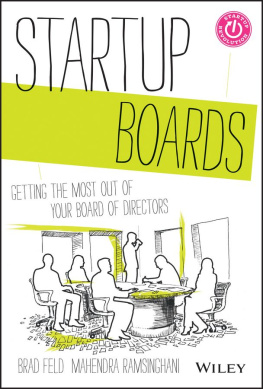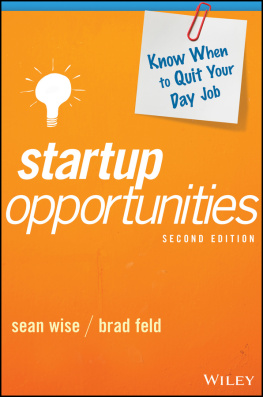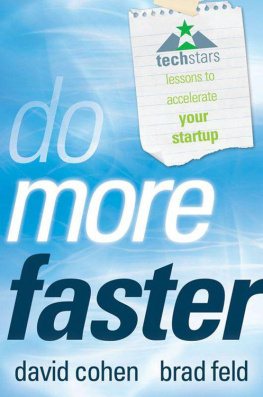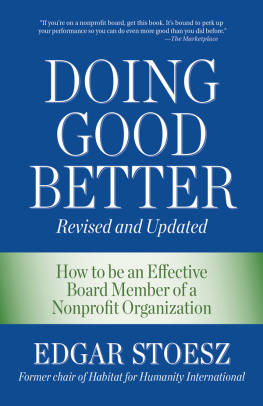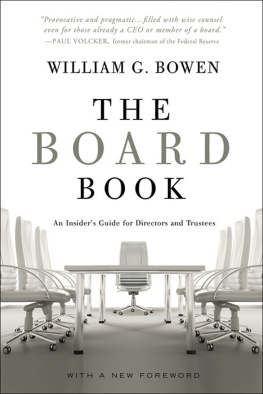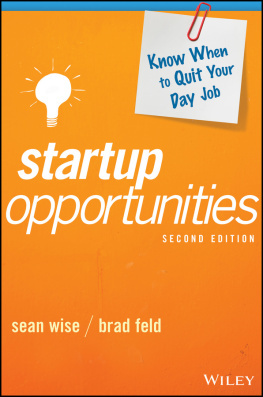Brad Feld - Startup Boards: Getting the Most Out of Your Board of Directors
Here you can read online Brad Feld - Startup Boards: Getting the Most Out of Your Board of Directors full text of the book (entire story) in english for free. Download pdf and epub, get meaning, cover and reviews about this ebook. City: Hoboken, NJ, year: 2014, publisher: Wiley, genre: Home and family. Description of the work, (preface) as well as reviews are available. Best literature library LitArk.com created for fans of good reading and offers a wide selection of genres:
Romance novel
Science fiction
Adventure
Detective
Science
History
Home and family
Prose
Art
Politics
Computer
Non-fiction
Religion
Business
Children
Humor
Choose a favorite category and find really read worthwhile books. Enjoy immersion in the world of imagination, feel the emotions of the characters or learn something new for yourself, make an fascinating discovery.
- Book:Startup Boards: Getting the Most Out of Your Board of Directors
- Author:
- Publisher:Wiley
- Genre:
- Year:2014
- City:Hoboken, NJ
- Rating:4 / 5
- Favourites:Add to favourites
- Your mark:
- 80
- 1
- 2
- 3
- 4
- 5
Startup Boards: Getting the Most Out of Your Board of Directors: summary, description and annotation
We offer to read an annotation, description, summary or preface (depends on what the author of the book "Startup Boards: Getting the Most Out of Your Board of Directors" wrote himself). If you haven't found the necessary information about the book — write in the comments, we will try to find it.
Brad Feld: author's other books
Who wrote Startup Boards: Getting the Most Out of Your Board of Directors? Find out the surname, the name of the author of the book and a list of all author's works by series.
Startup Boards: Getting the Most Out of Your Board of Directors — read online for free the complete book (whole text) full work
Below is the text of the book, divided by pages. System saving the place of the last page read, allows you to conveniently read the book "Startup Boards: Getting the Most Out of Your Board of Directors" online for free, without having to search again every time where you left off. Put a bookmark, and you can go to the page where you finished reading at any time.
Font size:
Interval:
Bookmark:
Contents

Cover images: Silhouettes of Business Couples and Silhouettes of Business Executives iStockphoto/4x6, Board Room and Paper Work iStockphoto/A-Digit; Boardroom Illustration by C. Wallace
Cover design: C. Wallace
Copyright 2014 by Brad Feld and Mahendra Ramsinghani. All rights reserved.
Published by John Wiley & Sons, Inc., Hoboken, New Jersey.
Published simultaneously in Canada.
No part of this publication may be reproduced, stored in a retrieval system, or transmitted in any form or by any means, electronic, mechanical, photocopying, recording, scanning, or otherwise, except as permitted under Section 107 or 108 of the 1976 United States Copyright Act, without either the prior written permission of the Publisher, or authorization through payment of the appropriate per-copy fee to the Copyright Clearance Center, Inc., 222 Rosewood Drive, Danvers, MA 01923, (978) 750-8400, fax (978) 646-8600, or on the Web at www.copyright.com . Requests to the Publisher for permission should be addressed to the Permissions Department, John Wiley & Sons, Inc., 111 River Street, Hoboken, NJ 07030, (201) 748-6011, fax (201) 748-6008, or online at http://www.wiley.com/go/permissions .
Limit of Liability/Disclaimer of Warranty: While the publisher and author have used their best efforts in preparing this book, they make no representations or warranties with respect to the accuracy or completeness of the contents of this book and specifically disclaim any implied warranties of merchantability or fitness for a particular purpose. No warranty may be created or extended by sales representatives or written sales materials. The advice and strategies contained herein may not be suitable for your situation. You should consult with a professional where appropriate. Neither the publisher nor author shall be liable for any loss of profit or any other commercial damages, including but not limited to special, incidental, consequential, or other damages.
For general information on our other products and services or for technical support, please contact our Customer Care Department within the United States at (800) 762-2974, outside the United States at (317) 572-3993 or fax (317) 572-4002.
Wiley publishes in a variety of print and electronic formats and by print-on-demand. Some material included with standard print versions of this book may not be included in e-books or in print-on-demand. If this book refers to media such as a CD or DVD that is not included in the version you purchased, you may download this material at http://booksupport.wiley.com . For more information about Wiley products, visit www.wiley.com .
ISBN 9781118443668 (Hardcover)
ISBN 9781118516843 (ePDF)
ISBN 9781118516829 (ePub)
Foreword
The phone rang at the appointed hour. My client, a software company CEO, was calling for his regular session. I picked up the phone.
Hello
Why the hell does my board act like that?
Good morning, James, I answered and we both laughed.
We talked through the upcoming financing. Some of the investorsfolks who came into the company only in the last roundwere already jockeying around terms and prices of the upcoming round. Some of the other directorsinvestors who had been with the company since the beginningwere also beginning to draw a hard line around terms that they would find acceptable.
In a sense, while they were all directors, as investors they were beginning to play a game of chicken with the companys financingeach holding fast to a position deemed best for the shareholders they represent and yet, as the negotiations ticked on, the companys ability to actually raise the needed funds could be jeopardized.
After the session, I asked him if I could quote him.
Sure, he said, just let me know if I ever end up with an actual video recording of me calling [the board member] a fuckheadits not that Id be bothered by that, its just that Id want to make sure I sent the link to all my friends.
A year ago I was sitting in the office of the CEO of a company on whose board I served. The recently elected chair and the CEO were screaming at each other and, as usual, I found myself trying to mediate.
What you dont understand, said the chair rising from his chair and trying to tower over the seated CEO, is that youre here, and he held out his right hand, palm down, and the board is here, and he moved his left hand on top of the right, again palm down, and Im here, and he placed his right hand over the left.
Capo dei capiboss of bosses.
My clients question was spot on: Why does this happen? What is it that makes the relationship among board members, investors, and management so tricky? And even when you remove the notion of director as investor (or investor representative) you can still end up with troubled relations.
The board/management relationship is tricky, complex, and nuanced. There are few structures within traditional businesses that are quite like it. Most businesses, indeed most organizations, are built on some variation of a command-and-control structure. Because of their inherent hierarchical nature, its often clear whos in charge, who makes the decisions, and whos ultimately responsible for what.
Even in businesses where the power and decision making reflects not the pyramid of classic command and control but the inverted pyramid of the ways in which information and therefore accountability should flow, theres relative clarity.
But when it comes to boards of directors, confusion is often the norm and, as a result, theres accompanying frustration and anger. For example, does the CEO work for the board of directors or the company? Does the board work for the company? Who holds individual board members accountable for their actions? What is the relationship between board and staff members?
Underlying all of this is the responsibility to represent the shareholders.
Ive served on dozens of boards of directorsthis includes public and private companies, for-profit businesses, and not-for-profit organizations. I think the core troubles stem from a misunderstanding of the key elements of the roles.
Directors arent quite like any other management position in an organization. They have power but often lack the information to wield that power as well as managers. They have perspectiveoften significantly more experience than senior managementbut, by the nature of their responsibility, they are disconnected from the day-to-day operations.
Directors need to remember they have a delicate balancing act of influencing without dictating, and engaging and sharing their experience and perspective by virtue of their gravitas as much as a result of their power.
Management, too, needs to remember that the task of being a director or a trustee is unlike any other job one has ever had. Theres an explicit accountability that goes along with the job, and that fact, combined with the implicit lack of information, can cause most folks to feel terribly anxious and to act in awful ways.
This book by Brad Feld and Mahendra Ramsinghani will help everyone on both sides of that divide to take a needed step back, see things from the other view, and work toward making the board as functional as possible.
JERRY COLONNA
Life and Business Coach
Retired Venture Capitalist
Chair, Naropa University
Acknowledgments
The original inspiration for the Startup Revolution series came from a conversation we had several years ago. Mahendra and Brad met briefly in person in Ann Arbor at an event that Brad and his partner Jason Mendelson held for Venture Deals: Be Smarter than Your Lawyer and Venture Capitalist . Mahendra followed up a few days later with an e-mail suggesting that we write a book about boards of directors together. A year later, a five-book series was launched, with Startup Boards as book number four.
Next pageFont size:
Interval:
Bookmark:
Similar books «Startup Boards: Getting the Most Out of Your Board of Directors»
Look at similar books to Startup Boards: Getting the Most Out of Your Board of Directors. We have selected literature similar in name and meaning in the hope of providing readers with more options to find new, interesting, not yet read works.
Discussion, reviews of the book Startup Boards: Getting the Most Out of Your Board of Directors and just readers' own opinions. Leave your comments, write what you think about the work, its meaning or the main characters. Specify what exactly you liked and what you didn't like, and why you think so.

